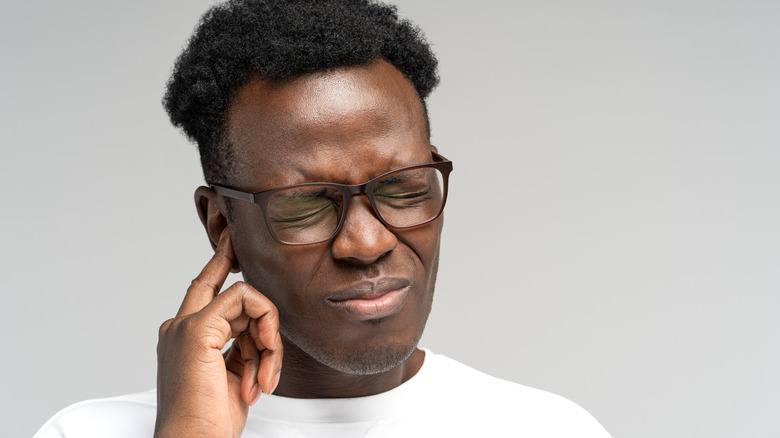Myths About Tinnitus You Need To Stop Believing
Is there anyone amongst us who hasn't experienced a phantom ringing in the ears? By phantom, we mean a sound that can be perceived, seemingly through one's sense of hearing, but which doesn't actually emanate from an audible source, per Medical Audiology Services. In other words, you can hear it, but others in your vicinity cannot — except in rare cases and possibly with the help of medical instruments. Nor will plugging or covering your ears do anything to stop or even dampen the vexing sound. The perception of hearing noise that isn't actually present in the environment is known as tinnitus, according to Sound Relief Hearing Center.
But tinnitus doesn't have to be a "ringing" per se. And while one might experience tinnitus once and only briefly, it can also come and go, per ENT Health. In some cases, it can persist for months at a time or longer. Millions of Americans have experienced tinnitus — indeed, the National Institute on Deafness and other Communication Disorders (NIDCD) estimates that as many as 25 million have experienced this phenomenon for at least five minutes over the last 12 months.
Tinnitus can happen to anyone, although it more commonly affects older adults and people regularly exposed to loud noises, per Yale Medicine. Despite its prevalence, tinnitus is not well understood, even by those who have experienced it firsthand. Accordingly, tinnitus has given rise to numerous myths, all of which we are here to debunk.
Myth: Tinnitus is a disease in and of itself
Tinnitus isn't actually disease at all. Rather, it's a symptom, often of some other disorder or problem in the auditory system, says ENT Health. Since the auditory system includes the ears, if you're experiencing tinnitus, it could point to something as benign as a bit of earwax that got stuck in your ear canal, per Signia. Or it could also have been brought on by a well-meaning attempt to remove earwax with a cotton swab. Tinnitus may also point to an ear infection (via NHS Inform).
Likewise, tinnitus might be symptomatic of any number of other conditions that can affect the ear. These include Meniere's Disease, which is also associated with vertigo and hearing loss, and otosclerosis, a genetic condition involving abnormal middle ear bone growth. Tinnitus may also be symptomatic of hearing loss itself. That includes age-related hearing loss. It also includes both temporary and not-so-temporary hearing loss caused by exposure to loud noises, which Dr. Fan-Gang Zeng, a hearing and speech expert at the University of California, Irvine, says is a "common cause" of tinnitus, via NIH News in Health.
The auditory system also includes those parts of the brain that facilitate the processing and interpreting of the information that we ultimately perceive as sound (per Neuroanatomy, Auditory Pathway). Accordingly, some cases of tinnitus are symptomatic of an illness or injury to the brain or related nerves, according to the Sound Relief Hearing Center.
Myth: Tinnitus only involves the auditory system
Although tinnitus is commonly associated with issues involving the auditory system, it may also be a symptom of some illnesses and conditions that don't immediately bring to mind matters relating to hearing. For example, some of the illnesses and conditions that may present with tinnitus as a symptom include those involving the jawbone — such as TMJ, which is known to cause ear discomfort (via Sound Relief Hearing Center). Others involve the thyroid, including both hypothyroidism and hyperthyroidism. Still others involve the blood and/or the circulatory system.
As the Mayo Clinic explains, "conditions that affect your blood vessels — such as atherosclerosis, high blood pressure, or kinked or malformed blood vessels — may cause blood to move through your veins and arteries with more force," which in turn can lead to the perception of sound that has no external source, per Penn Medicine. Likewise, iron deficiency anemia may prompt the arteries to pump the blood harder, possibly resulting in a form of tinnitus (via Hoffmann Audiology).
In rare cases, tinnitus may occur with nasopharyngeal cancer, per Cancer Research UK. The nasopharynx is the "tube-like structure behind the nasal cavity" that conditions the air that we draw in through the nose, NYU Langone Health explains. Tumors of the nasopharynx may put pressure on the Eustachian tubes, which connect to — you guessed it — the ear, possibly resulting in hearing loss and tinnitus.
Myth: If it's not a ringing sound, it's not tinnitus
The stereotypical ringing in the ears aside, tinnitus actually refers to any kind of phantom sound, according to Medical Audiology Services. To wit, in tinnitus arising out of cardiovascular disease or iron deficiency anemia, the sound will often be that of — literally — the blood pulsing through its vessels. So, rather than a "ringing" sound, people with this form of tinnitus may hear something more akin to a "whooshing," a "thumping," or a "glug-glugging." You may hear this referred to by clinicians as "pulsatile tinnitus," per Penn Medicine and Hoffmann Audiology.
Other sounds that have been associated with actual cases of tinnitus include "blowing, roaring, buzzing, hissing, humming, whistling, or sizzling," and some tinnitus sufferers report hearing the sounds of "air escaping, water running, the inside of a seashell, or musical notes." That last one — the hearing of phantom music — is sometimes referred to as Musical Ear Syndrome (MES), according to Hearing Consultants, which hypothesizes that MES may be significantly underreported in the medical literature because many who experience it may fear they're experiencing hallucinations. But rest assured, they're not.
Myth: Only people who can hear can experience tinnitus
Hearing loss is a common cause of tinnitus. According to Frontiers for Young Minds, when you begin losing hearing, your brain tries to "make up for the lack of input from the ear" that's caused by said hearing loss — resulting in tinnitus. Moreover, the ear damage caused by prolonged exposure to loud noises causes both hearing loss (via the Centers for Disease Control and Prevention) and tinnitus (via the National Institute on Deafness and Other Communication Disorders).
Given that tinnitus may worsen as hearing loss progresses, per Specialty Physician Associates, it stands to reason that even those with total hearing loss may, nevertheless, hear ringing in their ears, and/or other sounds associated with tinnitus. Although it might seem counterintuitive, "individuals who are deaf can hear tinnitus," as Rivka Strom, the Director of Audiology at Advanced Hearing NY, Inc., stated in Scary Symptoms. And that's true not only for those who've lost their hearing. It's also true for people who were born without hearing.
Myth: Tinnitus progressively leads to total hearing loss
Hearing loss and tinnitus are interrelated, with as many as 90% of people with tinnitus also having some degree of hearing loss, per Healthy Hearing. But it doesn't go both ways. Though is often assumed that tinnitus leads to hearing loss, this is not actually the case, according to the Mayo Clinic News Network. Though tinnitus can continue as hearing loss advances, it's a symptom rather than a cause of the condition leading to the hearing loss. At worst, tinnitus can potentially distract us in our attempts to listen and dampen the audible quality of what we're hearing.
That being said, tinnitus might actually afford a benefit for those with hearing loss, by giving their brains something to work with in the absence or relative lack of ambient sound, according to Dr. Fan-Gang Zeng, a hearing and speech expert at University of California, Irvine, via NIH News in Health. With hearing loss, some parts of the brain become less active, which could lead to "brain cell loss," Zeng told the outlet. But people with hearing loss who develop tinnitus tend to experience less cognitive decline, a study conducted by Zeng suggests.
Myth: Tinnitus is no big deal
Tinnitus can be a very big deal to those who suffer from it. According to Medical Audiology Services, tinnitus often goes away on its own, typically within a year of first presentation. But a year isn't exactly "music to the ears" of those who suffer from chronic tinnitus (i.e., tinnitus lasting three months or longer, according to InformedHealth); some who have experienced tinnitus for even just a few minutes might say that those few minutes bordered on intolerable. Unfortunately, we mean that literally, with prolonged tinnitus being the apparent precipitating factor in some cases of suicide, as the authors of a 2012 review published in the journal of Otolaryngology Head and Neck Surgery point out.
Fortunately, cases of suicide that can be traced directly to tinnitus are rare. Nevertheless, for some individuals, the phantom sounds associated with tinnitus can spoil their enjoyment of things (per the Mayo Clinic Health System). For some, the noise is distracting enough to cause difficulty concentrating. And difficulty concentrating can interfere not only with individual pursuits, but also with conversations and other forms of social interaction. The sounds of tinnitus are also known to contribute to sleep problems. Not surprisingly, tinnitus can leave one feeling exhausted, irritable, anxious, and depressed.
If you or anyone you know is having suicidal thoughts, please call the National Suicide Prevention Lifeline by dialing 988 or by calling 1-800-273-TALK (8255).
Myth: Tinnitus is caused solely by physical conditions
Many physical ailments are known to cause tinnitus, explains the Cleveland Clinic. But tinnitus may be brought about by several mental health maladies, according to the American Tinnitus Association. "Emotional stress is frequently associated with otologic symptoms as tinnitus and dizziness," according to the authors of a 2018 study published in journal Clinical Practice & Epidemiology in Mental Health, and they further add that "stress can contribute to the beginning or worsening of tinnitus."
Likewise, anxiety may cause tinnitus by activating the "fight-or-flight system," which prompts increased blood flow, including to the inner ear, which may precipitate a bout of tinnitus, according to Swift Audiology. And in turn, tinnitus may add to one's anxiety, per Hearing Resources Audiology Center. Similarly, it's long been known that the experience of tinnitus may cause sufficient emotional distress that it can lead to depression (via the Hearing Center of Excellence). Indeed, a 2020 study published in the journal, Otolaryngology–Head and Neck Surgery, found that 33% of tinnitus sufferers also suffer from depression.
However, scientists are not yet certain which comes first, depression or tinnitus, per Carolina Health and Hearing. In other words, it makes logical sense that prolonged tinnitus can bring about a depressed mood, but there's also the possibility that depression puts one at an increased risk for tinnitus, according to Psychiatry Advisor, citing a 2020 study published in the Journal of Affective Disorders.
Myth: Tinnitus and your diet are unrelated
As Healthy Hearing points out, the consumption of alcohol may contribute to both tinnitus and to hearing loss, which itself can cause tinnitus. Moreover, a 2020 study published in the journal Ear and Hearing found that people whose diets were richer in calcium, iron, and fat were more likely to experience tinnitus. The same research also noted that people with higher levels of vitamin B12 enjoyed a lower risk of tinnitus. Although diets high in animal protein are associated with higher levels of vitamin B12, per Harvard T.H. Chan School of Public Health, the study authors believe these results reflect that diets high in fat may contribute to cardiovascular issues, which may contribute to tinnitus. Moreover, poor circulatory health may lead to diabetes, which is also linked to hearing loss — a direct cause of tinnitus.
Accordingly, while there may be no known "anti-tinnitus diet" per se, the American Tinnitus Association (ATA) concludes that "a health-conscious diet can reduce hypertension and weight, increase blood flow, heighten energy levels, and improve emotional well-being — all of which can improve your tinnitus."
Myth: There's no treatment available
We'll concede that there is no specific pill you can take to prevent tinnitus or to make tinnitus go away once it presents its vexing self, per ENT Specialists of the Rockies. But there are many options to obtain some relief from the noise. For example, exercise may reduce mood issues that may contribute to tinnitus, and participating in social activities and hobbies may help distract you from focusing on the noise in your head.
In addition, a number of clinically administered therapies have proven helpful in making existing tinnitus more bearable. These include mindfulness-based stress reduction (MBSR) and Acceptance and Commitment Therapy (ACT), both of which encourage a gentle acceptance of the noise in your head so as to gain a sense of mastery over how you react to it. Biofeedback has also proven helpful in training tinnitus sufferers to control certain "autonomic functions," including their heart rate, which can help reduce the severity of some forms of tinnitus. In addition, specialized hearing aids may help some tinnitus sufferers to manage their condition. They work by amplifying ambient sounds, which can dampen the internal noise.
Myth: Your tinnitus is something only you can hear
Most of the time, if you have tinnitus, your doctor will take you at your word for it, because the sounds you're hearing will most likely not be audible to anyone outside your own head. That's because most cases of ear ringing and other phantom sounds in one's head constitute what's known clinically as "subjective tinnitus" — sounds that don't come from an external source. By contrast, "objective tinnitus" is tied to an actual, discernable noise — that of blood rushing through an ear-adjacent blood vessel, explains the Merck Manual.
Objective tinnitus, which is associated only with the type of tinnitus known as "pulsatile," is capable of being confirmed by a medical practitioner. A medical professional should be able to hear it either by listening quietly and carefully to the ear's activity, or by using a stethoscope, according to Dr. Wallace, speaking for the Hearing Center of Excellence. As the National Organization for Rare Disorders points out, however, pulsatile tinnitus is exceedingly rare, accounting for just a handful of tinnitus cases.











